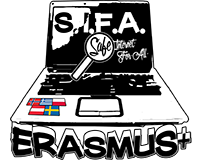Task 4 - quiz questions from Norway
- Written by
- Published in Ethics matters related to internet use: Results
These are the questions from the Norwegian students for task 4.
Copyright
1. Is it legal to use copyrighted material without permission?
a) Yes
b) No
c) Maybe
d) Everything on the internet is legal to use
2. What is copyright?
a) When you have the right to copy someone else’s work
b) A form for protection for your material granted by law for original work of authorship.
3. When is your work protected?
a) Your work is under copyright protection the moment it is created and fixed.
b) When you have registered your work with the copyright company
c) You need someone with a license to copyright your work for you
4. How long does copyright last?
a) As long as you want it to
b) Copyright lasts as long as the author/creator is alive
c) Copyright lasts as long as the author/creator is alive + 70 years
5. Do you own the copyright to the music if you buy it?
a) Yes
b) It depends on the music
c) You own that copy of the music, but you do not own the copyright itself
Plagiarism
1. What is plagiarism?
- Watching free movies online.
- To steel the ideas or words of another as your own.
- Giving out false information about yourself.
- Cheating on a test
2. What can happen if you are caught plagiarizing at school?
- You get top grade.
- You can be expelled.
- You can go to jail.
- You will get famous
3. Which of the following is considered plagiarism?
- Wearing the same clothes as someone else
- Giving incorrect information about the source
- Changing words but copying the sentence
- Copying a picture for a presentation but writing the source.
4. How can you avoid plagiarism?
- Have a private account on the internet
- Copy something from someone else first
- Talk to your teacher about it
- Make clear who wrote what when you copy something
5. Why is plagiarism such an important subject?
- Because stealing others ideas and words are bad
- Because it just is
- Because you can get a good grade without doing any work
- Because it can be misused in so many ways
Online rights
1. Which of these examples are legal online?
a) Defamation
b) Racism
c) Being nice
d) Bullying
2. Is taking a picture of your neighbor’s bedroom illegal?
a) Most Likely
b) Yes
c) No
d) I honestly do not know
3. What is grooming?
a) To schedule a date with someone under 16 years
b) To meet people on the internet
c) To stalk someone
d) To hack someone.
4. What is online rights?
a) Your rights online
b) To write right online
c) To see a movie that I haven’t paid for
d) To be nice to everyone online
5. Is grooming against your rights online?
a) Yes
b) Depends
c) Maybe
d) No
Online responsibilities
1. What are online responsibilities?
a) When you download a game online.
b) Something you should have in mind every time you use the Internet.
c) Cyberbullying.
d) When you post something on the Internet.
2. Are terms and conditions important?
a) Yes, very.
b) No, they do not matter.
c) What are terms and conditions?
d) I do not care about them.
3. Why are the terms and conditions so important?
a) So that you can post pictures online.
b) So that the Internet cannot abuse your information.
c) They are not important.
d) I do not know, I just agree to them.
4. When you see someone cyberbullying another person, what do you do?
a) Stop them.
b) I start bullying to.
c) Report it to someone who can help.
d) Start threatening the bullies.
5. Is there any difference if you are 14 or 18 when it comes to online responsibilities and respect?
a) They are the same.
b) You have less responsibility when you are 14.
c) Yes, there is a big difference.
d) When you are 18, you have more responsibility because you are legal.
Privacy
1. What are cookies?
a) Text, files, websites stored on your PC
b) Something you eat, something I once saw online
c) When websites steals information from you
2. What is phishing?
a) To trick you to dive up personal information about yourself
b) Another word for fishing
c) The same as spam-mail
d) A kind of virus
3. What is software «piracy»?
a) Software piracy is unauthorized use, copying or distribution of copyrighted software
b) When you download a software

